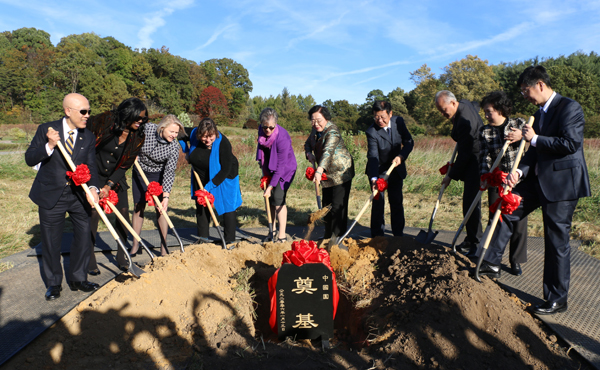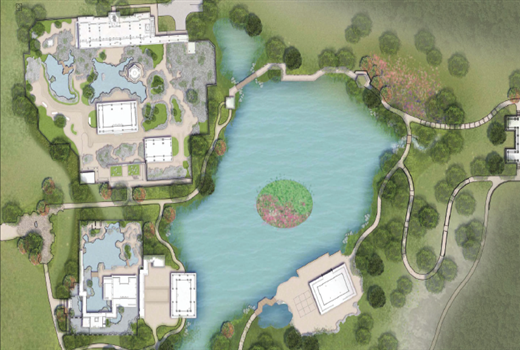China Garden breaks ground
|
 |
|
From left: Samuel Mok, president of National China Garden Foundation; Chavonda Jacobs-Young, administrator of Agricultural Research Service of the US Department of Agriculture (USDA); Susan Thornton, US principal deputy assistant secretary of state; Catherine Novelli, US undersecretary of state; Catherine Woteki, undersecretary and chief scientist of USDA; Jiang Zehui, vice-chair of the Committee of Population, Resources and Environment of CPPCC; State Forestry Administration Director Zhang Jianlong; Chinese Ambassador to the US Cui Tiankai; Le Aimei, vice-president of China Ecoculture Association and counselor of Ministry of Foreign Affairs; and Cong Peiwu, head of the Department of North American and Oceanian Affairs of Ministry of Foreign Affairs attend a groundbreaking ceremony on Friday afternoon for the China Garden in the US National Arboretum in Washington. The Memorandum of Understanding for the Sino-US China Garden Project was first signed in October 2004. [Chen Weihua/China Daily] |
After more than a decade in planning, the largest Chinese garden in North America finally broke ground on Friday afternoon inside the US National Arboretum in Washington and less than 3 miles from Capitol Hill.
The China Garden, a joint project by the US Department of Agriculture and China's State Forestry Administration, started as early as October 2004 when the two governments signed a memorandum of understanding for the project.
Jiang Zehui, the Chinese executive director for the project and now also vice-chair of the Committee of Population, Resources and Environment of Chinese People's Political Consultative Conference (CPPCC), was one of the people signing the MOU in 2004.
"The ground-breaking ceremony today for the China Garden by the Chinese and US sides signals that a 12-year dream will come true," she said on Friday.
The 12-acre China Garden in the heart of the National Arboretum will incorporate the best parts of Chinese gardens in China, such as the Mountain House of Sliced Stone, Boat Hall, Geyuan Garden, Five-Pavilion Bridge and White Pagoda in Yangzhou, the Drifting Fragrance Hall in Suzhou and Fish Viewing at Flower Harbor in Hangzhou's West Lake.
President Xi Jinping and US President Barack Obama made a decision for the groundbreaking in October when they met in Hangzhou in early September for the G20 Summit.
|
 |
|
A display map of the China Garden, situated on 12 lush acres in the heart of the US National Arboretum in Washington. Based on an original design from a team of Chinese designers, the China Garden, offers an extraordinary opportunity to build a lasting tribute to US-China relations in the capital. Provided to China Daily |
The groundbreaking ceremony in the arboretum on the sunny and breezy Friday afternoon was attended by some 100 people from Chinese and US sides, including many flying in from China.
Zhang Jianlong, head of China's State Forestry Administration, described the China Garden as bearing the friendship of 1.3 billion Chinese towards the American people.
Chinese Ambassador to the US Cui Tiankai believes that upon completion, the China Garden will become a new landmark in Washington and the East Coast. "It will build a unique bridge between the two peoples and inject new vitality into building a new model of great power relationship," he said.
Catherine Woteki, undersecretary and chief scientist of the US Department of Agriculture, said the garden was originally conceived as a focal point of strengthening people-to-people and cultural exchanges between our two countries. "And we fully expect there will be robust cultural programming once the construction is completed," she said.
Woteki added that Chinese garden has been the essence of the commitment to beauty and to excellence throughout history.
US Undersecretary of State Catherine Novelli said the China Garden will be essential for people to learn more about Chinese culture. "It will give researchers new insights into Asian gardens and plants, and will foster closer cooperation and mutual understanding among cultural institutions, representatives and scholars," she said.
Novelli said the garden will enable visitors and tourists to experience the exquisite beauty and symbolism of Chinese gardens, such as how the peony garden represents prosperity and beauty, how bamboo represents wisdom and how the rock arrangement symbolizes beauty, virtue and endurance.
Construction of the garden is likely to take three years, according to sources.

















